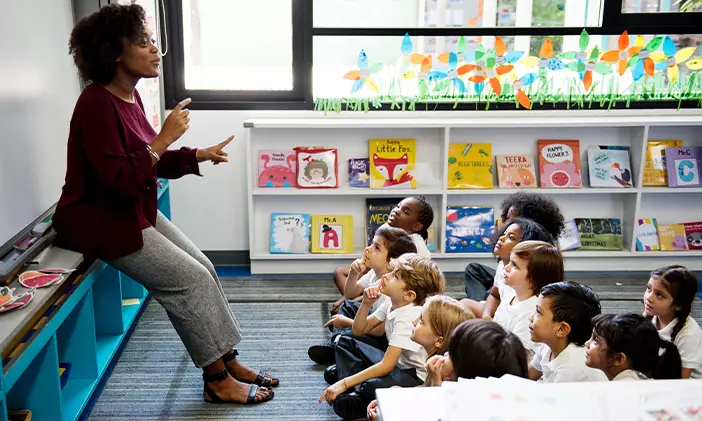
Written by Michael Feder

Reviewed by Pamela M. Roggeman, EdD, Dean, College of Education

Written by Michael Feder

Reviewed by Pamela M. Roggeman, EdD, Dean, College of Education

In the classroom, a teacher has the power to welcome students and create an environment that fosters learning, friendship and belonging. Any teacher or person working to be an educator has the power to affect students, whether as a role model, a source of emotional support or an instructor who inspires a lifelong love of learning.
But before any of this can happen, students need to feel they belong and are included in the learning process. This is the essence of an inclusive classroom, and it happens when teachers work to create a welcoming environment for everyone.
Establishing a consistent routine, modeling acceptable classroom behaviors, making learning fun and performing other key actions are all necessary to create an inclusive and welcoming environment for young learners.
One way teachers can promote inclusivity in their classroom is by encouraging open, honest dialogue among students. If a teacher or a student makes a mistake in the classroom, it’s important to own it. Teachers can model this by accepting responsibility for their own mistakes (“I forgot the materials for today’s project. I’m sorry.”) and encouraging students to do the same thing (“It’s OK if you forgot your homework. You can turn it in tomorrow for half credit.”). This is just one way a teacher can become a great teacher.
Tour classroom aesthetic affects students. When decorating, it is often easier to choose a theme, color or style that ties the entire room together. Be sure to check with your school and school district about rules for decorations in classrooms.
Keeping diversity in mind is also important. If you hang posters of students in your classroom, ensure a diverse group is depicted to ensure no one feels excluded. Representation in the classroom is just as important as it is outside of it.
Studies have shown it’s also possible that even color in a classroom can have an impact on students. Marketers and psychologists have long been aware of the effect that color can have on behavior and mood. For example, red is considered a more aggressive and active color, while blue is a more calming and quiet hue.
If you are teaching in a remote school versus in person, you can even shift the color of your background and your presentations for the chance to potentially improve the students’ moods and engagement.
Creating a consistent classroom schedule is another way to make students feel comfortable and safe, since a schedule helps students know what to expect each day.
Part of being inclusive is holding space for students with a variety of skills and struggles. When establishing your classroom routine, set aside additional time to help students who may have special needs or require extra assistance. Taking the time to go out of your way for individuals can make all the difference in their learning experience. If you create an environment where students know they all bring something unique to the table, ideally it will help their confidence.
Being active in the classroom can create a more inclusive environment that fosters skills such as teamwork and cooperation. Active habits are a vital part of living a healthy life, and by including active lessons in your curriculum, you can promote these habits within your students.
Having physical activity in the curriculum can make learning fun while promoting health and wellness. For example, include physical education throughout your school week. This can look like taking your class out for a game of dodgeball or whatever other opportunities your school may offer that gets everyone outside and moving.
One part of maintaining your classroom is staying in regular contact with parents and guardians. Before you begin teaching and interacting with parents, be sure to establish your own teaching philosophy. This may help guide you through difficult situations and conversations.
There are many reasons why you may need to contact a parent or guardian. Although some may think a teacher only calls when a student is in trouble, that is not always the case. One way to help students feel more welcome is to call home and tell their caregivers about good things they have done in your classroom.
When learning is made fun, students are more likely to pay attention, learn new things and apply what they’ve learned.
Some ways you can incorporate fun into your classroom are:
Adding fun can have an amazing impact on your students, and it also makes your workday more exciting.
Expressing pride in your students can make them feel more welcome in your classroom and create a stronger bond. It’s one thing for family to be proud of a student, after all, and another thing altogether to inspire those feelings in a person whom a student respects and admires.
When giving compliments to students, focus on academic and extracurricular accomplishments. You can also compliment specific personality traits, such as patience, leadership and curiosity. Even one brief, positive interaction can positively influence a student.
Creating a safe space can benefit your students as well. This means your classroom is a place where your students can come to you with their problems and difficulties. You can encourage students to talk with you about successes and challenges, but you must be prepared to offer neutral and encouraging guidance in return.
A safe space does not just mean you are there for them. It also means your classroom promotes respect and courtesy and prohibits bullying. By promoting a classroom culture of emotional safety, you let students know they are all welcome and in a safe environment.
A safe space can also provide an environment where students feel free to speak and not be judged. Being able to openly express their opinions can potentially build their confidence.
Whether you are taking the first step in your journey toward a career in education or looking to expand your existing knowledge and skill set, University of Phoenix offers a variety of degree and certificate options. These include:
Learn more about online education degrees and certificates through University of Phoenix.

A graduate of Johns Hopkins University and its Writing Seminars program and winner of the Stephen A. Dixon Literary Prize, Michael Feder brings an eye for detail and a passion for research to every article he writes. His academic and professional background includes experience in marketing, content development, script writing and SEO. Today, he works as a multimedia specialist at University of Phoenix where he covers a variety of topics ranging from healthcare to IT.

As dean of the University of Phoenix College of Education, Pamela Roggeman has spent over a decade in higher education teacher preparation in both the public and private sector. Her experience has included national partnerships that help to advance thought leadership in the field of education. Dr. Roggeman also serves as the President of the Arizona Educational Foundation’s Board of Directors.
This article has been vetted by University of Phoenix's editorial advisory committee.
Read more about our editorial process.
Read more articles like this: